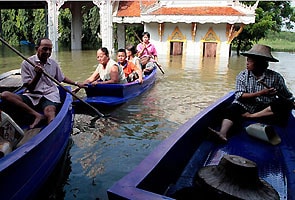
Lopburi (Thailand):
Devastating floods spreading from northeastern Thailand have left 17 people dead over the past two weeks as heavy rainfall has put entire villages underwater, destroyed crops and disrupted transportation and commerce.
Thailand's relatively well organized government services appeared to have been caught by surprise and in some areas overwhelmed, with some survivors stranded for days without government aid. Officials describe the flooding, which follows deadly inundations in Vietnam and other nearby countries, as the worst in half a century. Damage is estimated at more than $650 million.
Twenty-eight of the country's 77 provinces have been affected, including provinces just north of the capital, Bangkok. With the surge of water moving toward the mouth of the country's largest river system, the government has warned residents in some parts of the capital to prepare for flooding in the coming days.
Ten of 33 major reservoirs in Thailand are over capacity and are being forced to dump water downstream, according to the government's Department of Disaster Prevention and Mitigation.
Water is rushing through one crucial barrier about 110 miles north of Bangkok, the Pasak Jolasit dam here in Lopburi Province, at more than two times the normal flow for October. Engineers said that despite many pleas from cities and towns downstream to hold back the water, they instead opened the gates wider when the dam's reservoir reached 122 percent of its planned capacity.
"If we get any more water than this, we might have problems with the stability of the dam," Sornmith Singkanong, the head of water management, said from the dam's control room. The water level was the highest recorded in the 11 years since the dam was completed.
Mr. Sornmith said that the water levels in the reservoir appeared to have peaked -- the rainy season typically tapers off this month -- but that a surge could reach Bangkok within two days.
Kallaya Witsahamunee, 59, a primary school teacher stranded on the second floor of her house in Lopburi Province, said that the floodwater arrived suddenly this week.
"It's about neck-deep," Ms. Kallaya said by telephone.
She said Thursday that no officials or aid organizations had reached her village since the flooding began and that neighbors were delivering food by boat.
Ms. Kallaya said that she did not remember any flooding in at least 15 years in her area. "I guess that's why people got complacent," she said.
Thailand's relatively well organized government services appeared to have been caught by surprise and in some areas overwhelmed, with some survivors stranded for days without government aid. Officials describe the flooding, which follows deadly inundations in Vietnam and other nearby countries, as the worst in half a century. Damage is estimated at more than $650 million.
Twenty-eight of the country's 77 provinces have been affected, including provinces just north of the capital, Bangkok. With the surge of water moving toward the mouth of the country's largest river system, the government has warned residents in some parts of the capital to prepare for flooding in the coming days.
Ten of 33 major reservoirs in Thailand are over capacity and are being forced to dump water downstream, according to the government's Department of Disaster Prevention and Mitigation.
Water is rushing through one crucial barrier about 110 miles north of Bangkok, the Pasak Jolasit dam here in Lopburi Province, at more than two times the normal flow for October. Engineers said that despite many pleas from cities and towns downstream to hold back the water, they instead opened the gates wider when the dam's reservoir reached 122 percent of its planned capacity.
"If we get any more water than this, we might have problems with the stability of the dam," Sornmith Singkanong, the head of water management, said from the dam's control room. The water level was the highest recorded in the 11 years since the dam was completed.
Mr. Sornmith said that the water levels in the reservoir appeared to have peaked -- the rainy season typically tapers off this month -- but that a surge could reach Bangkok within two days.
Kallaya Witsahamunee, 59, a primary school teacher stranded on the second floor of her house in Lopburi Province, said that the floodwater arrived suddenly this week.
"It's about neck-deep," Ms. Kallaya said by telephone.
She said Thursday that no officials or aid organizations had reached her village since the flooding began and that neighbors were delivering food by boat.
Ms. Kallaya said that she did not remember any flooding in at least 15 years in her area. "I guess that's why people got complacent," she said.
Track Latest News Live on NDTV.com and get news updates from India and around the world

